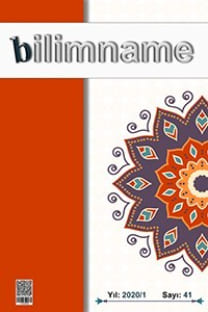THOMAS AQUINAS’IN DE AETERNIATE MUNDI (ÂLEMİN EZELİLİĞİNE DAİR) RİSALESİNİN DEĞERLENDİRMESİ
AN EVALUATION ON DE AETERNIATE MUNDI BY THOMAS AQUINAS
___
- AKDAĞ, Özcan, “Alem Ezeli Midir? Duns Scotus’un Yaklaşımı Üzerine Bir İnceleme” Şırnak Üniversitesi 10/22 (2019), 217-31.
- AKDAĞ, Özcan. İbn Rüşd, İbn Meymûn ve Aquinas Bağlamında Âlemı̇n Ezelı̇lı̇ğı̇ Problemı̇. Kayseri: Kimlik Yayınları, Kayseri, 2019.
- ANSELM of CANTERBURY. Monologion, içinde Complete Philosophical and Theological Treatises of Anselm of Canterbury. trans. Jasper Hopkins and Herbert Richardson, Minneapolis: The Arthur J. Banning Press, 2000.
- AQUINAS, Thomas. Commentary on Aristotle's Physics. trans. by Richard J. Blackwell, Richard J. Spath, Edmund Thrlkel, Pierre H. Conway, New Haven: Yale University Press, 1963.
- AQUINAS, Thomas. Commentary on the Book of Causes (Super Librum De Causis Expositio). trans. and annotated by Vincent A. Guagliardo, Charles R. Hess, Richard C. Taylor, Washington D.C.: The Catholic University of America Press, 1996.
- AQUINAS, Thomas. Commentary on the Metaphysics of Aristotle. I-II, çev. John P. Rowan, Chicago: Henry Regnery Company, 1961.
- AQUINAS, Thomas. Compendium of Theology (CT). Richard J. Regan (trans.) Oxford: Oxford University Press, 2009.
- AQUİNAS, Thomas. Exposition of Aristotle’s Treatise on the Heavens (In libros De caelo et mundo Aristotelis). Columbus, Ohio: College of St. Mary of the Springs, 1963-1964.
- AQUINAS, Thomas. On the Power of God I-III, (Questiones Disputatae De Potentia Dei). English Dominican Fathers (trans.), Westmister: Maryland: The Newman Press, 1952.
- AQUINAS, Thomas. On the Truth of the Catholic Faith: Summa Contra Gentiles (SCG). Vol.I-IV, trans: Anton C. Pegis, Image Books, Doubleday & Company, Inc., 1956.
- AQUINAS, Thomas. Summa Theologica (ST). Vol. I-V, trans: Fathers of the English Dominican Province, Ave Maria Press, 1998.
- ARISTOTELES. On Generation and Corruption. içinde The Basic Works of Aristotle, Richard McKeon (ed. with intro.), New York: Random House, 2001.
- AUGUSTINE. City of God. içinde, Great Books of the Western World, Vol.18, 129-620.
- BALDNER, Steven E., and Carroll, William E. (trans.). Aquinas on Creation: Writings on the ‘Sentences’ of Peter Lombard, Book 2, Distinction 1, Question 1. Toronto: Pontifical Institute of Mediaeval Studies, 1st ed., 1997.
- BOETHIUS. The Consolation of Philosophy. trans. H. R. James, Moscow: Roman Roads Media, 2015.
- BRADY, Ignatius. “John Pecham and the Background of Aquinas’s De aeternitate mundi”. içinde, Saint Thomas Aquinas, 1274-1974: Commemorative Studies. Armand A. Maurer (ed.) Vol. I-II, Toronto: Pontificial Institute of Medieval Studies, 1974, II, 141-54.
- BUKOWSKI, P. Thomas. “J. Pecham, T. Aquinas, et al., on the Eternity of the World”. Recherches de théologie ancienne et médiévale 46 (1979), 216- 21.
- BUKOWSKI, Thomas P. “An Early Dating for Aquinas’ De aeternitate mundi”. Gregorianum 51/2 (1970), 277-304.
- DALES, Richard C. Medieval Discussions of the Eternity of the World. Leiden: E. J. Brill, 1990.
- İSKENDEROĞLU, Muammer. Fakhr Al-Dīn Al-Rāzī and Thomas Aquinas on the Question of the Eternity of the World. Leiden: Brill, 2002.
- İSKENDEROĞLU, Muammer. Fakhr Al-Dīn Al-Rāzī and Thomas Aquinas on the Question of the Eternity of the World. Leiden: Brill, 2002.
- KOVACH, Francis J.. “The Question of the Eternity of the World in St. Bonaventure and St. Thomas Aquinas -A Critical Analysis”. The Southwestern Journal of Philosophy 5/2 (1974), 141-72.
- MALCOLM De Mowbray, “The De Aeternitate Mundi of Boethius of Dacia and the Paris Condemnation of 1277”, Recherches de théologie et philosophie médiévales 73/ 2 (2006), 201-253
- St. JOHN of DAMASCUS. An Exact Exposition of The Orthodox Faith. Create Space Independent Publishing Platform, Wyatt North Publishing, 2012.
- WEISHEIPL, James A. “The Date and Context of Aquinas’ De Aeternitate mundi”. içinde Graceful Reason: Essays in Ancient and Medieval Philosophy Presented to Joseph Owens. CSSR, ed. Lloyd P. Gerson, Toronto: Pontifical Institute of Medieval Studies, 1983, 239-71.
- WILKS, Ian. “Aquinas On The Past Possibility Of The World's Havıng Existed Forever”. The Review of Metaphysics 48/2 (1994), 299-329.
- WIPPEL, John F. “Did Thomas Aquinas Defend the Possibility of an Eternally Created World? (The De aeternitate mundi Revisited)”. Journal of the History of Philosophy 19/1 (1981), 21-37.
- WIPPEL, John F. “The Condemnation of 1270 and 1277 at Paris”. Journal of Medieval and Renaissance Studies 7/2 (1977), 169-201.
- WIPPEL, John F. “Thomas Aquinas on the Possibility of the Eternal Creation”. İçinde, Metaphysical Themes in Thomas Aquinas. Wahington D.C.: Catholic University of America Press, 1984.
- ISSN: 1304-1878
- Yayın Aralığı: 2
- Başlangıç: 2003
- Yayıncı: -
DİN DİLİ VE ANTONY FLEW’UN İNANÇ DEĞİŞİKLİĞİNİN DİN DİLİNE YANSIMASI
Ayşe Sıdıka OKTAY, Mehmet Burak GÜNEŞ
EBÜ’L-BEREKÂT EL-BAĞDÂDÎ VE İBN SÎNÂ BAĞLAMINDA NEFİSLERİN BİREYSELLEŞMESİ
KUR'AN-I KERİM TEFSİRİ TEMELİNDE EVRENSEL HUKUKUN KUR'ANÎ PRENSİPLERİ
TEMSİLÎ-ALEGORİK TARTIŞMALARI BAĞLAMINDA BİR AŞK MESNEVİSİ: ŞEMS Ü KAMER
FUAT SEZGİN`E GÖRE MÜSLÜMANLARIN BİLİMSEL BAŞARILARININ ARKASINDAKİ ETKENLER
ORTA ASYA'NIN KADİM MEDENİYET KANDİLİ: KUTADGU BİLİG
AKADEMİSYENLERİN FAİZ VE FAİZSİZ FİNANS KULLANIMINA YÖNELİK TUTUMLARI
